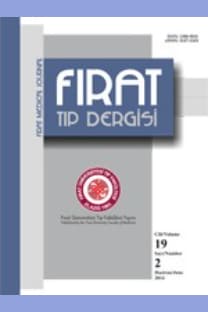GGK Testi Pozitifliğine Bağlı Tarama Kolonoskopileri Normal Saptanan Hastalarda Üst GİS Endoskopisi Uygulanmalı Mı?
Should Upper GIS Endoscopy Be Applied in Patients with Normal Screening Colonoscopies Due to FOB Test Positivity?
___
- 1. Zappa M, Visioli CB, Ciatto S et al. Gastric cancer after positive screening faecal occult blood testing and negative assessment. Dig Liver Dis 2007; 39: 321-6.
- 2. UK Colorectal Cancer. Screening pilot group. Results of the first round of a demonstration pilot of screening for colorectal cancer in the United Kingdom. BMJ 2004; 329: 133.
- 3. Hisamuddin K, Mowat NA, Phull PS. Endoscopic findings in the upper gastrointestinal tract of faecal occult blood-positive, colonoscopy-negative patients. Dig Liver Dis 2006; 38: 503-7.
- 4. Ng JY, Chan DK, Tan KK. Is gastroscopy for fecal immunochemical test positive patients worthwhile? Int J Colorectal Dis 2017; 32: 95-8.
- 5. Choi JS, Choi JY, Cho HG et al. Is esophagogastroduodenoscopy necessary in patients with positive fecal occult blood tests and negative colonoscopy? Scand J Gastroenterol 2013; 48: 657-62.
- 6. Triadafilopoulos G, Aslan A. Same-day upper and lower inpatient endoscopy: a trend for the future. Am J Gastroenterol 1991; 86: 952-5.
- 7. Zappa M, Visioli CB, Ciatto S et al. Gastric cancer after positive screening faecal occult blood testing and negative assessment. Dig Liver Dis 2007; 39: 321-6.
- 8. Bond JH. FOBT is not an effective way to screen for gastric cancer. Dig Liver Dis 2007; 39: 327-8.
- 9. Nakama H, Zhang B. Immunochemical fecal occult blood test is inadequate for screening test of stomach cancer. Dig Dis Sci 2000; 45: 2195-8.
- 10. Ali M, Yaqub M, Haider Z, Anees I, Bhargava S, Gian J. Yield of dual endoscopy for positive fecal occult blood test. Am J Gastroenterol 2003; 98: 82-5.
- 11. Chonlada Krutsri, Chairat Supsamutchai, Pitichote Hiranyatheb, Pongsasit Singhatas, Tharin Thampongsa, Jakrapan Jirasiritham. Advantages of Routine Upper-Gastrointestinal Endoscopy in Positive Fecal Occult Blood Tests with Negative Colonoscopy Results. J Med Assoc Thai 2018; 101: 53-7.
- 12. Karagoz H, Karaman A. Helicobacter pylori incidence of patients with gastritis in endoscopic biopsies. J Surg Med 2020; 4: 359-62.
- 13. Demirtas L, Sayar I, Akbas EM et al. Distribution of the incidence and location of the Helicobacter pylori according to age and gender in patients who undergone endoscopy. Dicle Med J 2014; 41: 507- 11.
- 14. NIH Consensus Conference. Helicobacter pylori in peptic ulcer disease. NIH Consensus Development Panel on Helicobacter pylori in Peptic Ulcer Disease. JAMA 1994; 272: 65-9.
- 15. Uemura N, Okamoto S, Yamamoto S et al. Helicobacter pylori infection and the development of gastric cancer. N. Engl. J. Med 2001; 345: 784-9.
- 16. Wotherspoon A, Ortiz-Hidalgo C, Falzon M, Isaacson P. Helicobacter pylori-associated gastritis and primary B-cell gastric lymphoma. Lancet 1991; 338: 1175-6.
- 17. D’Elios M, Appelmelk B, Amedei A, Bergman M, Del Prete G. Gastric autoimmunity: the role of Helicobacter pylori and molecular mimicry. Trends Mol. Med 2004; 10: 316-23.
- 18. Seiji Shiota, Kazunari Murakami, Toshio Fujioka, Yoshio Yamaoka. Population-based strategies for Helicobacter pylori-associated disease management: a Japanese perspective. Expert Rev Gastroenterol Hepatol 2010; 4: 149-56.
- 19. Velez JP, Schwesinger WH, Stauffer J et al. Bidirectional endoscopy in patients with fecal occult blood. Surg Endosc 2002; 16: 117-20.
- ISSN: 1300-9818
- Başlangıç: 2015
- Yayıncı: Fırat Üniversitesi Tıp Fakültesi
Desmoplastik Malign Melanom Tanısında Güçlü Tanısal Belirteç: Fascin Olabilir mi?
Aylin ORGEN ÇALLI, Mehmet Ali UYAROĞLU
Maksillofasiyal Travmada Periorbital Yabancı Cisim
Cemal FIRAT, Göçmen ASLAN, Mehmet Fatih ALGAN
Hasta Çocukların Annelerinde Sağlıklı Yeme Takıntısı Eğilimi
Taş Cilt Mesafesinin Supin Perkütan Nefrolitotomi Sonuçlarına Etkileri
Mehmet YILDIZHAN, Yalçın KIZILKAN, Cüneyt ÖZDEN, Erem ASİL, Ünsal EROĞLU
B-Talasemi Taşıyıcılarında Ventriküler Depolarizasyon ve Repolarizasyon Farklı mıdır?
Taner KASAR, Saadet AKARSU, Erdal YILMAZ
Stevens-Johnson Sendromu/Toksik Epidermal Nekroliz ve İlaç Ateşi Birlikteliği olan Bir Olgu Sunumu
Mehmet KILIÇ, Erdal TASKIN, Ömer GÜNBEY, Fatma Betül GÜNBEY
Erhan ÖNALAN, Sevler YILDIZ, Murad ATMACA, Osman KURT, Sevda KORKMAZ, Aslı KAZGAN, Muhammed Fatih TABARA
Fatal Vascular Complication and Autotransfusion System Use After Lumbar Disc Surgery: A Rare Case
Bilgehan ERKUT, Ferhat BORULU, Hakan USTA
Funda CERAN, Defne KALAYCI, Burcu POLAT GÜLTEKİN, Simten DAĞDAŞ, Neslihan BAYRAKTAR BİLEN, Mürüvet Sda AYDIN2, Gülsüm ÖZET
